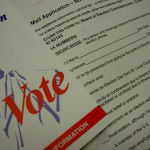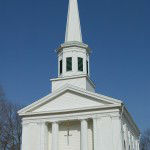Menu
Hot-Topics
February 19, 2026 | SCOTUS Reaffirms Fourth Amendment Standard for Police Responding to Household Emergencies
Month: May 2012

Will the Voting Rights Act Come Before the Supreme Court Again?
The debate is growing over Section 5 of the Voting Rights Act of 1965, which requires states and municipalities with a history of voter discrimination to obtain federal approval before making any changes to their voting laws. Republican attorneys ...

SOUTH CAROLINA v. KATZENBACH
Syllabus of the Court Invoking the Court's original jurisdiction under Art. III, § 2, of the Constitution, South Carolina filed a bill of complaint seeking a declaration of unconstitutionality as to certain provisions of the Voting Rights ...

BROWN v. BOARD OF EDUCATION
Syllabus of the Court Segregation of white and Negro children in the public schools of a State solely on the basis of race, pursuant to state laws permitting or requiring such segregation, denies to Negro children the equal protection of the...

Brown v. Board of Education Marks 58th Anniversary, But Has Segregation Gone Away?
On Thursday, May 18 it was 58 years since the U.S. Supreme Court held in Brown v. Board of Education that segregation in public schools violated the Fourteenth Amendment of the U.S. Constitution. While that case led to a national policy of school d...

The Ministerial Exception: Does It Extend Beyond Hosanna-Tabor?
A controversial employment discrimination lawsuit pending in Indiana may test the limits of the “ministerial exception,” most recently considered in Hosanna-Tabor Evangelical Lutheran Church and School v. EEOC. Both cases involve the power of rel...

HOSANNA-TABOR EVANGELICAL LUTHERAN CHURCH AND SCHOOL v. EQUAL EMPLOYMENT OPPORTUNITY COMMISSION et al.
Syllabus of the Court Petitioner Hosanna-Tabor Evangelical Lutheran Church and School is a member congregation of the Lutheran Church–Missouri Synod. The Synod classifies its school teachers into two categories: “called” and “lay.”...

PADILLA v. KENTUCKY
Syllabus of the Court Petitioner Padilla, a lawful permanent resident of the United States for over 40 years, faces deportation after pleading guilty to drug-distribution charges in Kentucky. In postconviction proceedings, he claims that his...

Does Padilla v. Kentucky Apply Retroactively? Supreme Court to Decide Next Term
The U.S. Supreme Court has agreed to revisit its decision in Padilla v. Kentucky to determine if its ruling should be applied retroactively. The landmark ruling tackled the controversial link between deportation and criminal offenses, ultimately con...

MCCULLOCH v. MARYLAND
Syllabus of the Court Congress has power to incorporate a bank The Act of the 10th of April, 1816, ch. 44, to "incorporate the subscribers to the Bank of the United States" is a law made in pursuance of the Constitution. The Government...

Will the Arizona Immigration Case Reshape the Balance of Power Dating Back to McCulloch?
In April, the U.S. Supreme Court heard oral arguments in the landmark case, State of Arizona v. United States. The lawsuit addresses the authority of the state of Arizona to enact its own immigration enforcement laws instead of following federal regu...
Previous Articles
SCOTUS Decision in Bowe v. United States Is First of the 2026 Term
by DONALD SCARINCI on February 5, 2026
In Bowe v. United States, 607 U.S. ___ (2026), the U.S. Supreme Court held that Title 28 U.S.C. § ...
SCOTUS Rules State Can’t Immunize Parties from Federal Civil Liability
by DONALD SCARINCI on January 29, 2026
In John Doe v. Dynamic Physical Therapy, LLC, 607 U.S. ____ (2025) the U.S. Supreme Court held that...
Supreme Court to Address Racial Discrimination in Jury Selection
by DONALD SCARINCI onWhile the U.S. Supreme Court has concluded oral arguments for the year, it continues to add cases t...
The Amendments
-
Amendment1
- Establishment ClauseFree Exercise Clause
- Freedom of Speech
- Freedoms of Press
- Freedom of Assembly, and Petitition
-
Amendment2
- The Right to Bear Arms
-
Amendment4
- Unreasonable Searches and Seizures
-
Amendment5
- Due Process
- Eminent Domain
- Rights of Criminal Defendants
Preamble to the Bill of Rights
Congress of the United States begun and held at the City of New-York, on Wednesday the fourth of March, one thousand seven hundred and eighty nine.
THE Conventions of a number of the States, having at the time of their adopting the Constitution, expressed a desire, in order to prevent misconstruction or abuse of its powers, that further declaratory and restrictive clauses should be added: And as extending the ground of public confidence in the Government, will best ensure the beneficent ends of its institution.
Awards





